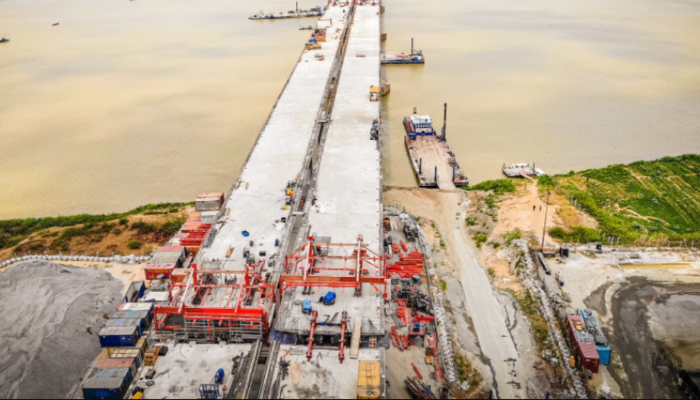Construction giant Julius Berger, the contractor responsible for the Second Niger Bridge, has officially handed over the completed bridge to the Federal Government. Stretching over 1.6 kilometers, the bridge connects Anambra and Delta states and came with an estimated cost of ₦336 billion.
Initiated on May 23, 2023, during the final days of former President Muhammad Buhari’s tenure, the project required additional work on ancillary roads and other construction activities post-inauguration.
In a brief ceremony at the bridge’s toll area, Minister of Works Dave Umahi expressed satisfaction with the project. He confirmed that the contractor successfully repaired vandalized sections of the bridge. Umahi also announced that the bridge is available for concession to private companies willing to complete associated roads, manage toll collection, and recoup their investments. Plans are underway to ease traffic at both the old and new bridges during the upcoming festive season.

Umahi commended President Bola Ahmed Tinubu for his dedication to road infrastructure development, citing the completion of the Second Niger Bridge. While acknowledging the positive impact on reducing traffic congestion in the area, Umahi noted that the project was not fully completed. Two interchanges are planned to redirect traffic away from Asaba and Onitsha towns.
Lars Richter, Managing Director of Julius Berger Nigeria Plc, clarified that the handover was a technical one, confirming the completion of the Main Second Niger Bridge and readiness of toll stations for use.
Historically, the concept of a Second Niger Bridge was proposed in 1978/79 by Shehu Shagari, a candidate for the National Party of Nigeria (NPN). Subsequent military governments gave little attention to the project. It wasn’t until the return to civilian rule that President Olusegun Obasanjo pledged to deliver a second Niger River bridge. However, significant progress was only made when the project was flagged off in Asaba five days before Obasanjo handed over to Umaru Musa Yar’Adua’s administration.
Under Jonathan’s administration in August 2012, the Federal Executive Council approved an N325 million contract for the final planning and design of the bridge. During the 2011 Nigerian general election campaign, Jonathan promised to complete the project by 2015.
The Buhari administration initially canceled the contract approved by Jonathan in 2015 but later opted to fund the project through the Presidential Infrastructure Development Fund (PIDF), managed by the NSIA. PIDF also supported the construction of the Lagos-Ibadan expressway and the Abuja-Kaduna-Kano-Road.
The Second Niger Bridge opened for local traffic on December 15, 2022. Temporary routes have been established to accommodate ongoing construction of connecting roads, ensuring accessibility during the Christmas holidays. As of now, there is no charge for crossing the bridge.
Support InfoStride News' Credible Journalism: Only credible journalism can guarantee a fair, accountable and transparent society, including democracy and government. It involves a lot of efforts and money. We need your support. Click here to Donate
